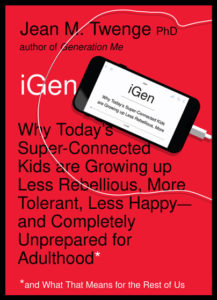 With generational divides wider than ever, parents, educators, and employers have an urgent need to understand today’s rising generation of teens and young adults. Born after 1995, iGen is the first generation to spend their entire adolescence in the age of the smartphone. With social media and texting replacing other activities, iGen spends less time with their friends in person – perhaps why they are experiencing unprecedented levels of anxiety, depression, and loneliness.
With generational divides wider than ever, parents, educators, and employers have an urgent need to understand today’s rising generation of teens and young adults. Born after 1995, iGen is the first generation to spend their entire adolescence in the age of the smartphone. With social media and texting replacing other activities, iGen spends less time with their friends in person – perhaps why they are experiencing unprecedented levels of anxiety, depression, and loneliness.
But technology is not the only thing that makes iGen distinct from every generation before them; they are also different in how they spend their time, how they behave, and in their attitudes toward religion, sexuality, and politics. They socialize in completely new ways, reject once sacred social taboos, and want different things from their lives and careers. More than previous generations, they are obsessed with safety, focused on tolerance, and have no patience for inequality. iGen is also growing up more slowly than previous generations: eighteen-year-olds look and act like fifteen-year-olds used to.
As this new group of young people grows into adulthood, we all need to understand them: Friends and family need to look out for them; businesses must figure out how to recruit them and sell to them; colleges and universities must know how to educate and guide them. And members of iGen also need to understand themselves as they communicate with their elders and explain their views to their older peers. Because where iGen goes, so goes our nation—and the world.
Drawing from nationally representative surveys of 11 million young people as well as in-depth interviews, iGen is the first book to document the cultural changes shaping today’s teens and young adults, documenting how their changed world has impacted their attitudes, worldviews, and mental health.
Table of Contents:
- Introduction: Who Is iGen, and How Do We Know?
- Chapter 1: In No Hurry: Growing Up Slowly
- Chapter 2: Internet: Online Time – Oh, and Other Media, Too
- Chapter 3: In Person No More: I’m with You, But Only Virtually
- Chapter 4: Insecure: The New Mental Health Crisis
- Chapter 5: Irreligious: Losing My Religion (and Spirituality)
- Chapter 6: Insulated but Not Intrinsic: More Safety and Less Community
- Chapter 7: Income Insecurity: Working to Earn – but Not to Shop
- Chapter 8: Indefinite: Sex, Marriage, and Children
- Chapter 9: Inclusive: LGBT, Gender, and Race Issues in the New Age
- Chapter 10: Independent: Politics. Conclusion: Understanding – and Saving – iGen
- Appendices (PDF)



